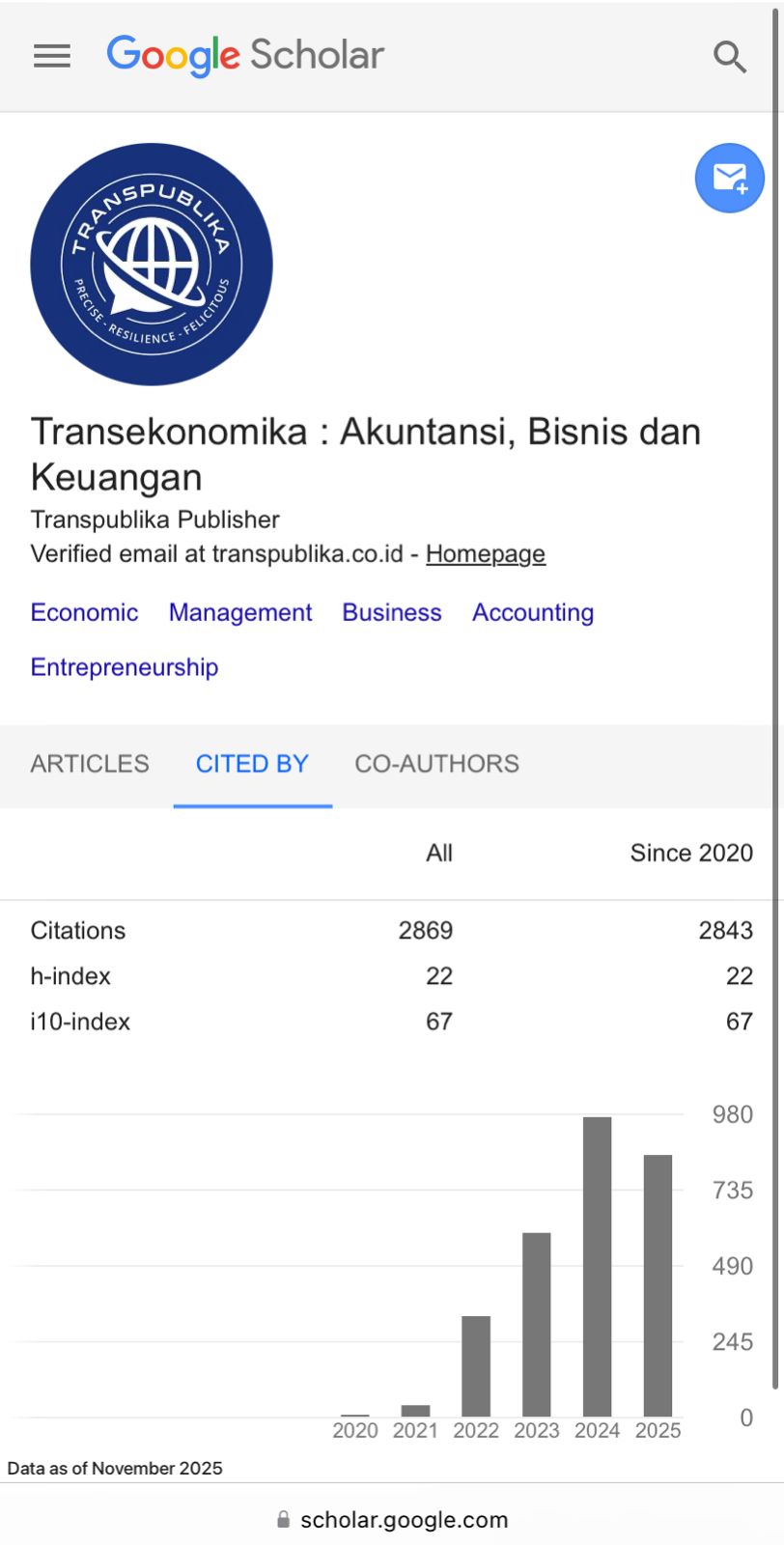PENGARUH SUPPLY CHAIN MANAGEMENT TERHADAP OPERASIONAL PERUSAHAAN DAN KENDALA PROCUREMENT SISTEM ERP PADA PT UNILEVER INDONESIA TBK
DOI:
https://doi.org/10.55047/transekonomika.v2i3.133Keywords:
ERP, Supply Chain Management, Performance, Production, SystemAbstract
This research aims to determine the effect of Supply Chain Management and constraints of existing ERP systems in PT Unilever Indonesia Tbk is a company engaged in the household production industry by offering food products, beverages, kitchen needs, to toiletries. In an effort to develop its business operations, it is known that PT Unilever Indonesia Tbk implements its management strategy through ERP and Supply Chain Management systems. The ERP system at PT Unilever Indonesia Tbk functions as an information integration tool for all company stakeholders, while Supply Chain Management functions as a tool for monitoring the flow of goods to consumers and the amount of inventory. Thus, the two strategies are related to the certainty of the performance of Unilever employees. This paper aims to analyze the performance and the relationship between supply chain management, and the effect of the ERP system implemented by Unilever companies on operational performance through interaction and communication of information in order to be efficient in implementing supply chain management strategies and ERP systems. The research method uses a document study approach, as well as primary and secondary data collection techniques. The results of the study reveals that the Supply Chain Management strategy of PT Unilever Indonesia Tbk has four components, namely supply chain uncertainty, management of economies of scale, selection of transportation modes, and product inventory control; as well as the ERP and Supply Chain Management systems of PT Unilever Indonesia Tbk have a positive and significant impact on the company's performance so as to obtain profits and achieve company goals.
Downloads
References
Budiarti, A. (2006). Fit/Gap Analysis. Aplikasi Dan Analisis Literatur Fasilkom UI, 4–25.
Cahya, N., & Maula, K. A. (2021). Faktor-Faktor Yang Mempengaruhi Penawaran Dan Permintaan Bahan Pokok Di Indonesia. Transekonomika: Akuntansi, Bisnis Dan Keuangan, 1(4), 311–320. https://doi.org/https://doi.org/10.55047/transekonomika.v1i4.56
Cooper, M. C., Lambert, D. M., & Pagh, J. D. (1997). Supply chain management: more than a new name for logistics. The International Journal of Logistics Management, 8(1), 1–14.
Eric, W. (2004). Komparasi Sistem Manufaktur Push Dan Pull Melalui Pendekatan Simulasi. Jurnal Teknik Industri, 6(1), 71–78.
Fernando, D. (2020). Pengaruh Implementasi Sistem Erp Terhadap Kinerja Perusahaan. Jurnal Ilmiah Sains Dan Teknologi, 4(2), 171–177. https://doi.org/10.47080/saintek.v4i2.1016
Guritno, A. D., & Harsasi, M. (2014). Pengantar Manajemen Rantai Pasok ( Supply Chain Management ). Ekma, 4371(Modul 1), 1–35.
Hadiguna, R. A. (2017). Manajemen Rantai Pasok Agroindustri (Issue January).
Kurniawan, H., Garchia, C. H., Ayucitra, A., & Antaresti. (2017). Usulan Konseptual Sistem Distribusi Cross Docking Untuk Meminimumkan Biaya Distribusi Pada Industri Retail. Ilmiah Widya Teknik, 16(1), 26–31.
Lukman. (2021). Supply Chain Management (M. S. Prof. Dr. Okto R. Payangan (ed.)).
Makalew, A. G., Jan, A. H., & Karuntu. (2019). Analisis Peran Supply Chain Management Terhadap Keunggulan Bersaing Pada Pt. Mitra Kencana Distribusindo Manado Analysis of the Role of Supply Chain Management on Competitive Advantage in Pt. Mitra Kencana Distribusindo Manado. 5446 Jurnal EMBA, 7(4), 5446–5455.
Monk, E., & Wagner, B. (2012). Concepts in enterprise resource planning. Cengage Learning.
O’Brien, J. A., & Marakas, G. M. (1997). Introduction to information systems.
Okyere, E. (2011). Supply Chain Management. Phys. Rev. E, June, 53.
Paramitha, I. A. (2017). Supply Chain Management. Convention Center Di Kota Tegal, 15.
Prasetyowati, H., & Panjawa, J. L. (2022). Teknologi Dan Distribusi Pajak Mendukung Kualitas Pembangunan Manusia. Transekonomika: Akuntansi, Bisnis Dan Keuangan, 2(2), 23–36.
Ruslim, T. S. (2013). Analisis Pengaruh Supply Chain Management Terhadap Loyalitas Konsumen. Journal of Industrial Engineering & Management Systems, 6(1), 33–45.
Sangadah, K., & Kartawidjaja, J. (2020). Pengaruh Keselarasan Strategi Rantai Pasokan Dan Ketidakpastian Lingkungan Terhadap Kinerja SCM. Orphanet Journal of Rare Diseases, 21(1), 1–9.
Shakespeare, W. (2014). jenis-jenis Enterprise Resource Planning. Paper Knowledge . Toward a Media History of Documents, 18, 9–26.
Tineges, R. (2021). Data Sekunder adalah Jenis Data yang Wajib Diketahui. DQLab.
Zulfanahri, et all. (2019). Analisis Dan Evaluasi Proses Material Management Berbasis Sap Pada Pt. Unilever, Tbk. 1–2.
Zulianti, D., & Aslam, N. (2022). Implementation Of Management System On Halal Certification For Medan City MSMES Actors. CASHFLOW : Current Advanced Research On Sharia Finance And Economic Worldwide, 1(3), 11–16. https://doi.org/https://doi.org/10.55047/cashflow.v1i3.166








.png)







.png)


.png)

.png)












